Beautiful Russian stage and film actress Alla Larionova (1931-2000) was one of the most popular stars of the Soviet cinema of the 1950s. She was known for such films as the Fairy-tale Sadko (1952), Anna na shee (1954) and Trizhdy voskresshiy (1960).
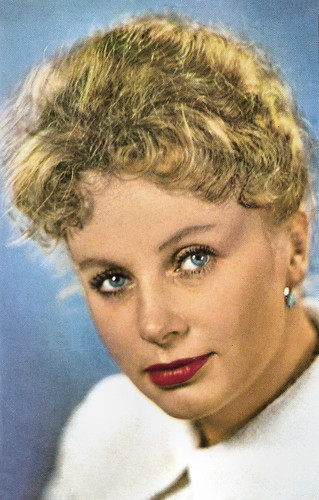
Russian postcard, no. A 09462, 1965. Photo: G. Ter-Ovanesova.
Alla Dmitrievna Larionova was born in Moscow, USSR (now Russia), in 1931. Her father was an employee of a food store, and her mother worked as a keeper in a kindergarten. Her parents named her after the film star Alla Tarasova and thus programmed their little daughter for the future.
After her father had gone to the front, Alla and her mother evacuated to Menzelinsk, where her mother worked in a hospital. Here, 9-year-old Alla Larionova appeared for the first time on stage. She read poetry to the wounded in the hospital. When she was barely 15 years old, the young and charming Alla was discovered for the cinema. An unfamiliar woman approached her on the street and asked if the girl wanted to act in films. Of course, Larionova wanted and appeared in a small part in the biographical drama Michurin (Aleksandr Dovzhenko, 1949), featuring Grigori Belov.
After graduation, Alla went to study as an actress at the Lunacharsky State Institute for Theatre Arts (GITIS) in Moscow. In 1948, she continued her studies at the Gerasimov Institute of Cinematography (VGIK), where she met her future husband, Nikolai Rybnikov. At the GITIS, she failed miserably at her exams. Before her examiners, she saw the famous director Vasily Mikhailovich Goncharov and got a black-out. However, during her study years, she got a star-making role, which determined her entire career in the cinema. She played Lyubava in Sadko (Aleksandr Ptushko, 1952) with Sergei Stolyarov. The Fairy-tale film was so successful that the following year, the film was invited to the Venice Film Festival, where it won the Silver Lion.
This success meant an international breakthrough for Soviet cinema. In Venice, the beautiful Larionova was followed by crowds of journalists and admirers. Well-known producers and directors, including Charles Chaplin, offered her roles that she flatly refused. As the Russian website 24smi writes: “Official representatives, officials who accompanied a group of artists abroad, were strictly forbidden to go to contacts with ‘bourgeois’ directors.” Larionova returned home from Italy in tears. She had been allowed to touch a beautiful world, to see it, but was forbidden to live in it.
Back home, she was offered the leading role in Anna na shee/The Anna Cross (Isidor Annensky, 1954), based on a short story by Anton Chekhov. The film turned Larionova into a big star of Soviet cinema. Hundreds of people, often in bad weather, stood in queues in front of cinemas to see the film. After the actress starred as the beautiful Olivia in Dvenadtsataya noch/Twelfth Night (A. Abramov, Yan Frid, 1955), fans followed her to the studio and her apartment, looked in windows and waited for her exit. Even the minister of culture came to see the actress.
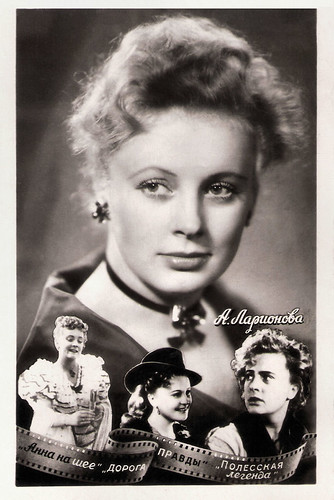
Russian postcard, no. AB13758, 1958. Photo: V. Kačna.
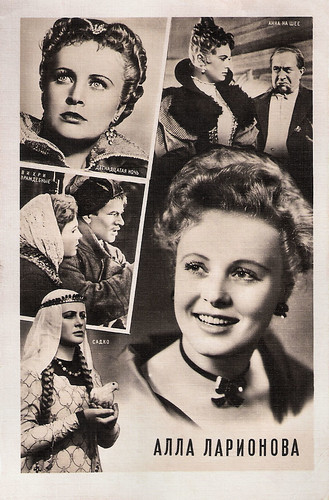
Russian multiview postcard, no. 1446, 1963. Included are scene photos from Sadko (1952), Vikhri vrazhdebnye/Hostile Whirlwinds (Mikhail Kalatozov, 1953), Anna na shee (1954), and Dvenadtsataya noch/Twelfth Night (A. Abramov, Yan Frid, 1955).
Curiously, Alla Larionova was not offered any more leading roles, and her career seemed to be hindered by officials. For example, for the film Ilya Muromets/The Sword and the Dragon (Aleksandr Ptushko, 1956), Larionova was not allowed to travel to Yalta, where the shooting of the film took place. Her few leading roles in the following years included Sudba barabanshchika/The Drummer's Fate (Viktor Eisymont, 1956), the romance Mlechnyy Put/Milky Way (Isaak Shmaruk, 1959) and Trizhdy voskresshiy/Thrice Resurrected (Leonid Gayday, 1960).
During the 1960s and 1970s, Alla Larionova never got leading roles. When the beautiful actress starred in a film, it was in ‘ugly’ roles, such as in Dikiy myod/Wild Honey (Vladimir Chebotaryov, 1967), where her face was smeared with mud.
Larionova proved that she could play character roles very well. She played Natalia Dmitrievna Paskudin in the Anton Chekhov adaptation Tri sestry/The Three Sisters (Samson Samsonov, 1964), Donesova in Ko mne, Mukhtar!/Come Here, Mukhtar! (Semyon Tumanov, 1965), Elena Ivanovna in Fokusnik/The Magician (Pyotr Todorovskiy, 1967) and Ekaterina II in the family comedy Yest ideya!/There is an idea! (Vladimir Bychkov, 1977).
But the kind of roles that had made her famous, she was not offered anymore. When she turned 60, Alla Larionova was given the title People's Artist of the RSFSR in 1990, but no significant roles followed. Russian Wikipedia suggests the reason was a scar on her face caused by an accident. Actor George Yumatov, in a state of intoxication, had decided to take Alla Larionova home and caused the accident in which she hit her head and cut her lip. After that, she ceased to appear in films since the scar was too noticeable.
Larionova lived very quietly and modestly. She travelled around the country with the theatre group named after Eugene Vakhtangov. She was married to Nikolai Rybnikov from 1957 till his death in 1990. Shortly after their marriage was registered, she gave birth to her daughter Alena with actor Ivan Pereverzev. In 1961, their second daughter, Arina, was born. Alla Larionova died from a heart attack in 2000 in Moscow, Russia. She was buried next to her husband at the Troekurovsky cemetery. In 2004, their daughter Arina, addicted to alcohol, died.
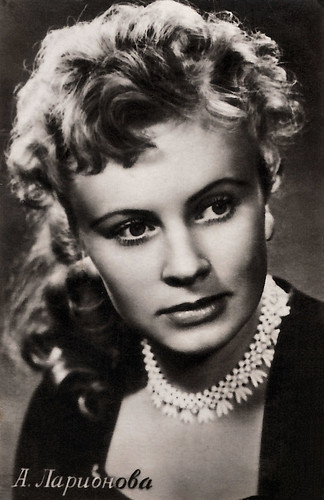
Small Russian collectors card.
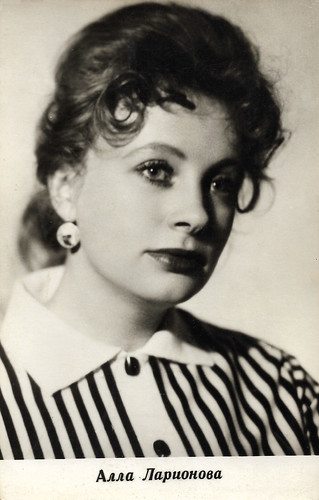
Russian postcard, no. A-06650. Photo: G. Vajlja.
Sources: 24 smi (Russian), Wikipedia (Russian) and IMDb.
This post was last updated on 3 March 2025.

Russian postcard, no. A 09462, 1965. Photo: G. Ter-Ovanesova.
A forbidden beautiful world
Alla Dmitrievna Larionova was born in Moscow, USSR (now Russia), in 1931. Her father was an employee of a food store, and her mother worked as a keeper in a kindergarten. Her parents named her after the film star Alla Tarasova and thus programmed their little daughter for the future.
After her father had gone to the front, Alla and her mother evacuated to Menzelinsk, where her mother worked in a hospital. Here, 9-year-old Alla Larionova appeared for the first time on stage. She read poetry to the wounded in the hospital. When she was barely 15 years old, the young and charming Alla was discovered for the cinema. An unfamiliar woman approached her on the street and asked if the girl wanted to act in films. Of course, Larionova wanted and appeared in a small part in the biographical drama Michurin (Aleksandr Dovzhenko, 1949), featuring Grigori Belov.
After graduation, Alla went to study as an actress at the Lunacharsky State Institute for Theatre Arts (GITIS) in Moscow. In 1948, she continued her studies at the Gerasimov Institute of Cinematography (VGIK), where she met her future husband, Nikolai Rybnikov. At the GITIS, she failed miserably at her exams. Before her examiners, she saw the famous director Vasily Mikhailovich Goncharov and got a black-out. However, during her study years, she got a star-making role, which determined her entire career in the cinema. She played Lyubava in Sadko (Aleksandr Ptushko, 1952) with Sergei Stolyarov. The Fairy-tale film was so successful that the following year, the film was invited to the Venice Film Festival, where it won the Silver Lion.
This success meant an international breakthrough for Soviet cinema. In Venice, the beautiful Larionova was followed by crowds of journalists and admirers. Well-known producers and directors, including Charles Chaplin, offered her roles that she flatly refused. As the Russian website 24smi writes: “Official representatives, officials who accompanied a group of artists abroad, were strictly forbidden to go to contacts with ‘bourgeois’ directors.” Larionova returned home from Italy in tears. She had been allowed to touch a beautiful world, to see it, but was forbidden to live in it.
Back home, she was offered the leading role in Anna na shee/The Anna Cross (Isidor Annensky, 1954), based on a short story by Anton Chekhov. The film turned Larionova into a big star of Soviet cinema. Hundreds of people, often in bad weather, stood in queues in front of cinemas to see the film. After the actress starred as the beautiful Olivia in Dvenadtsataya noch/Twelfth Night (A. Abramov, Yan Frid, 1955), fans followed her to the studio and her apartment, looked in windows and waited for her exit. Even the minister of culture came to see the actress.

Russian postcard, no. AB13758, 1958. Photo: V. Kačna.

Russian multiview postcard, no. 1446, 1963. Included are scene photos from Sadko (1952), Vikhri vrazhdebnye/Hostile Whirlwinds (Mikhail Kalatozov, 1953), Anna na shee (1954), and Dvenadtsataya noch/Twelfth Night (A. Abramov, Yan Frid, 1955).
Hindered by the officials
Curiously, Alla Larionova was not offered any more leading roles, and her career seemed to be hindered by officials. For example, for the film Ilya Muromets/The Sword and the Dragon (Aleksandr Ptushko, 1956), Larionova was not allowed to travel to Yalta, where the shooting of the film took place. Her few leading roles in the following years included Sudba barabanshchika/The Drummer's Fate (Viktor Eisymont, 1956), the romance Mlechnyy Put/Milky Way (Isaak Shmaruk, 1959) and Trizhdy voskresshiy/Thrice Resurrected (Leonid Gayday, 1960).
During the 1960s and 1970s, Alla Larionova never got leading roles. When the beautiful actress starred in a film, it was in ‘ugly’ roles, such as in Dikiy myod/Wild Honey (Vladimir Chebotaryov, 1967), where her face was smeared with mud.
Larionova proved that she could play character roles very well. She played Natalia Dmitrievna Paskudin in the Anton Chekhov adaptation Tri sestry/The Three Sisters (Samson Samsonov, 1964), Donesova in Ko mne, Mukhtar!/Come Here, Mukhtar! (Semyon Tumanov, 1965), Elena Ivanovna in Fokusnik/The Magician (Pyotr Todorovskiy, 1967) and Ekaterina II in the family comedy Yest ideya!/There is an idea! (Vladimir Bychkov, 1977).
But the kind of roles that had made her famous, she was not offered anymore. When she turned 60, Alla Larionova was given the title People's Artist of the RSFSR in 1990, but no significant roles followed. Russian Wikipedia suggests the reason was a scar on her face caused by an accident. Actor George Yumatov, in a state of intoxication, had decided to take Alla Larionova home and caused the accident in which she hit her head and cut her lip. After that, she ceased to appear in films since the scar was too noticeable.
Larionova lived very quietly and modestly. She travelled around the country with the theatre group named after Eugene Vakhtangov. She was married to Nikolai Rybnikov from 1957 till his death in 1990. Shortly after their marriage was registered, she gave birth to her daughter Alena with actor Ivan Pereverzev. In 1961, their second daughter, Arina, was born. Alla Larionova died from a heart attack in 2000 in Moscow, Russia. She was buried next to her husband at the Troekurovsky cemetery. In 2004, their daughter Arina, addicted to alcohol, died.

Small Russian collectors card.

Russian postcard, no. A-06650. Photo: G. Vajlja.
Sources: 24 smi (Russian), Wikipedia (Russian) and IMDb.
This post was last updated on 3 March 2025.
No comments:
Post a Comment